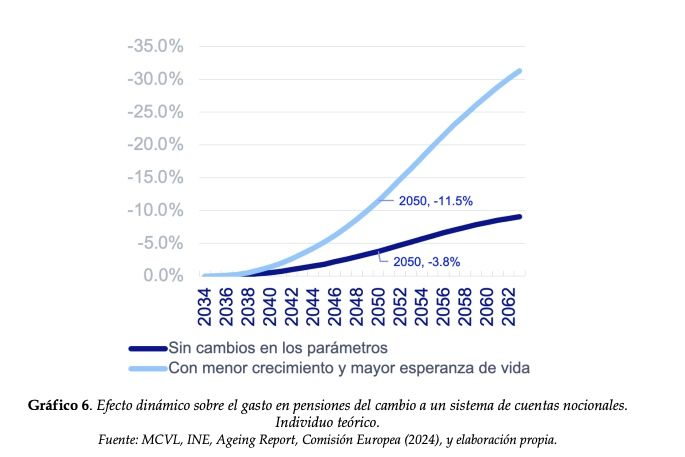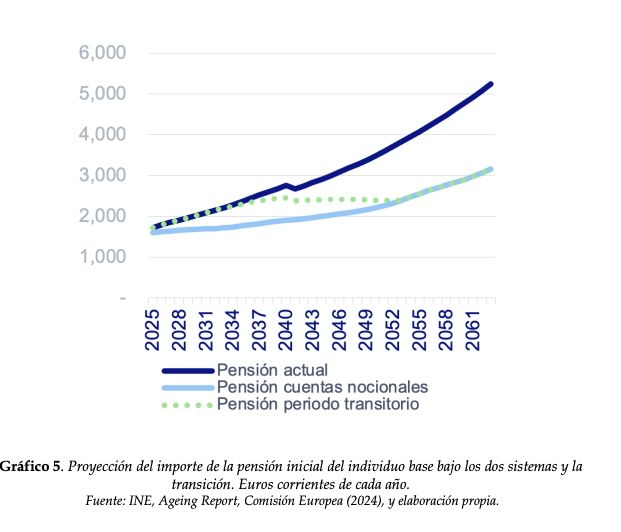After raising a delay of retirement age and revalue the pensions below the CPI; ask for a flexible retirement, which combines pension and work in a personalized way; propose more years of contributions for mothers and not a complement for the gender gap; suggest a surcharge on personal income tax to pay pensions; criticize the fictitious contribution to the piggy bank pension (“It is done by issuing more debt”), the Foundation for Applied Economics Studies (Fedea @socialfedea) now proposes to adopt “gently”, in a period of no less than 20 years, a notional account pension system.
According to this think tank, it would reduce pension spending by up to 40% in the long term, It would reinforce sustainability and ensure proportionality between contributions made and benefits received.
This is what the study defends Transition towards a notional account pension system in Spain, carried out by researchers José Enrique Devesa, Rafael Doménech and Robert Meneu, who assure that this system “has an actuarial logic: each worker accumulates the value of his contributions in a virtual account, revalued with a notional rate linked to macroeconomic variables, and the accumulated balance is transformed into an initial pension through an actuarial factor dependent on age and life expectancy at the time of retirement”.

The new system, only for those born since 1971
More in detail, Fedea proposes transition to this new system of notional accounts in a term of 20 years. It would be applied towards the retirement of the born from 1971 onwards, but initially in combination with the current system, whose weight would decrease by 5% each year.
Thus, 5% of the pension of the 1971 cohort would be calculated by the notional accounts system and 95% by applying the current system, while for those born in 1990 the new system would be applied 100%.
For Fedea, the transition to the new system would reduce pension spending substantially. According to his calculations, in a optimistic scenario (with future GDP growth of 2.24%) Savings would be 3.8% in 2050 and 10.7% in the long term. With future growth of 1.23%, savings would be 11.5% in 2050 and 40.1% in the long term. Measured as a percentage of GDP, the savings in 2050 would be 0.6% GDP in the optimistic scenario and 1.7% in the second case.

It would benefit the lower regulatory bases
A well-designed system of notional accounts would automatically resolve the inequalities of the current system, since the contributory effort made throughout one’s working life is proportionally valued, compared to the current system that favors short, irregular work careers or high regulatory bases, explain the authors of the report.
Thus, with the new system they would leave people with lower regulatory bases benefited, those who have longer careers, and those who retire early. As a consequence, and indirectly, the self-employed and men They would also benefit slightly.
“All of this is because the notional accounts system guarantees by design balance and actuarial equity, so that all individuals obtain expected pensions proportional to their contributory effort throughout their working life,” the study states.
The average pension would be 12% lower
In this work, Fedea compares, with 2023 data from the Continuous Sample of Working Lives (MCVL), the average contributory pension under the current system and under the notional accounts system.
Without taking into account the gender gap complement or applying the minimum and maximum limits, the average pension in 2023 with the current system reaches 1,421 euros monthly, 12.2% higher than the amount that would derive from a system of notional accounts ripe (1,248 euros monthly).
This variable, that of pensions lower on average than those of the current system, would be, for Fedea, the first to take into account in order to design a smooth transition towards a system of notional accounts. Thus, he points out that correcting that 12% requires a transitional period of between 10 and 20 years.
However, Fedea points out that the difference in pensions between individuals should be corrected at the same time. In fact, the average absolute deviation is equivalent to 15% of the average pension at the individual level. This assessment is the second one that, in his opinion, should be taken into account when choosing a more or less long transitional period.
In some cases, The decrease in the average pension of 12% is added to the decrease in the individual pension to correct inequality (short careers or high regulatory bases), being the ddifference greater than 20%, so Fedea would not advise a transitional period less than 20 years.
“The simulations indicate that the introduction of notional accounts would result in more moderate, but sustainable, initial pensions and without the need to ensure its financing with additional resources to the contributions,” defends Fedea.
Fedea highlights that the proposed system would cut “high” replacement rates and Spanish replacement pensions (initial pension on last salary and average pension on average salary). In the Currently, the average Spanish pension represents 74% of the average salary and 107% of the most frequent salary.
To adopt a system with notional accounts, would converge to levels in line with European standards, of a 50%-60% of the average salary, depending on the organism.


